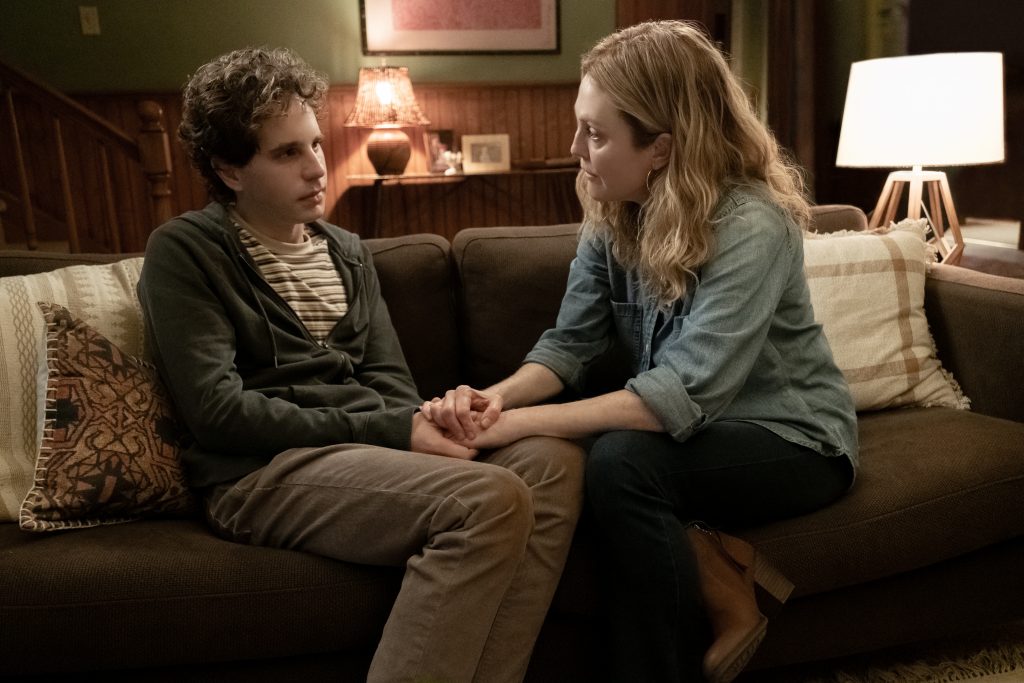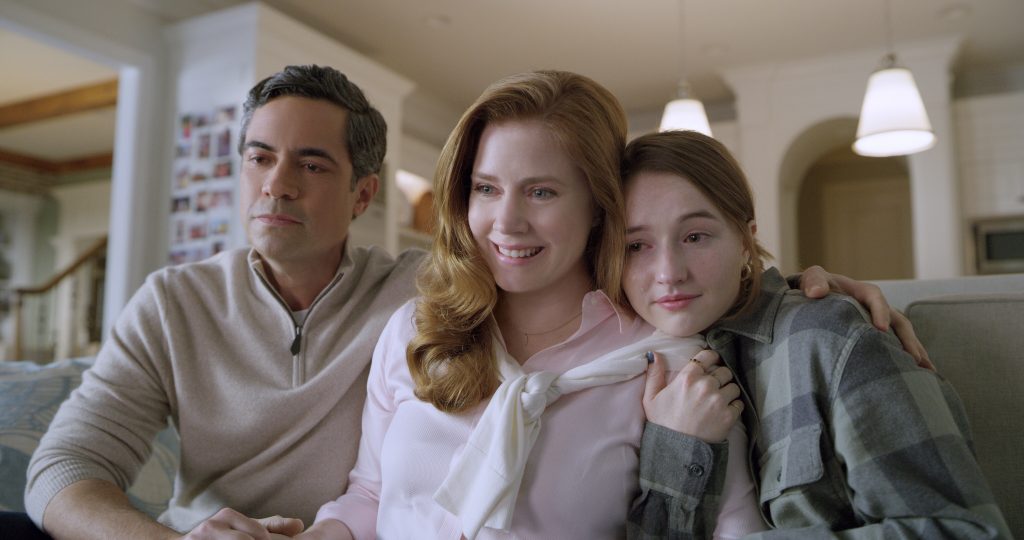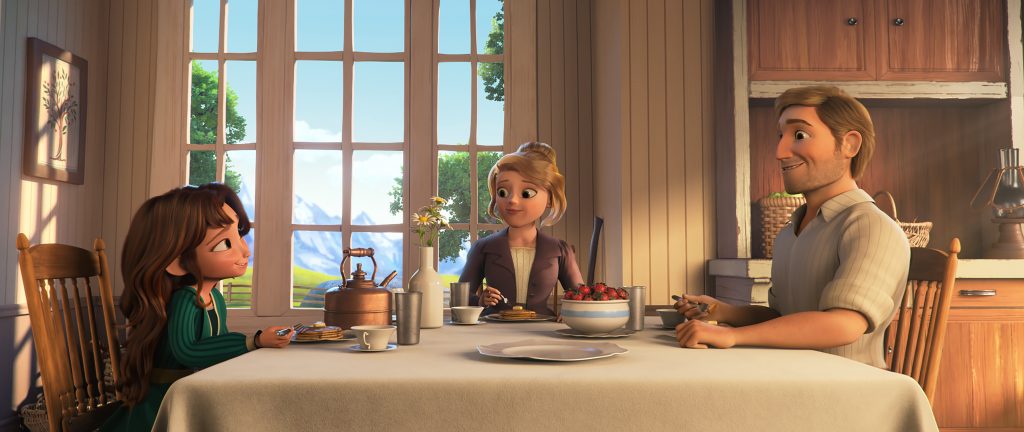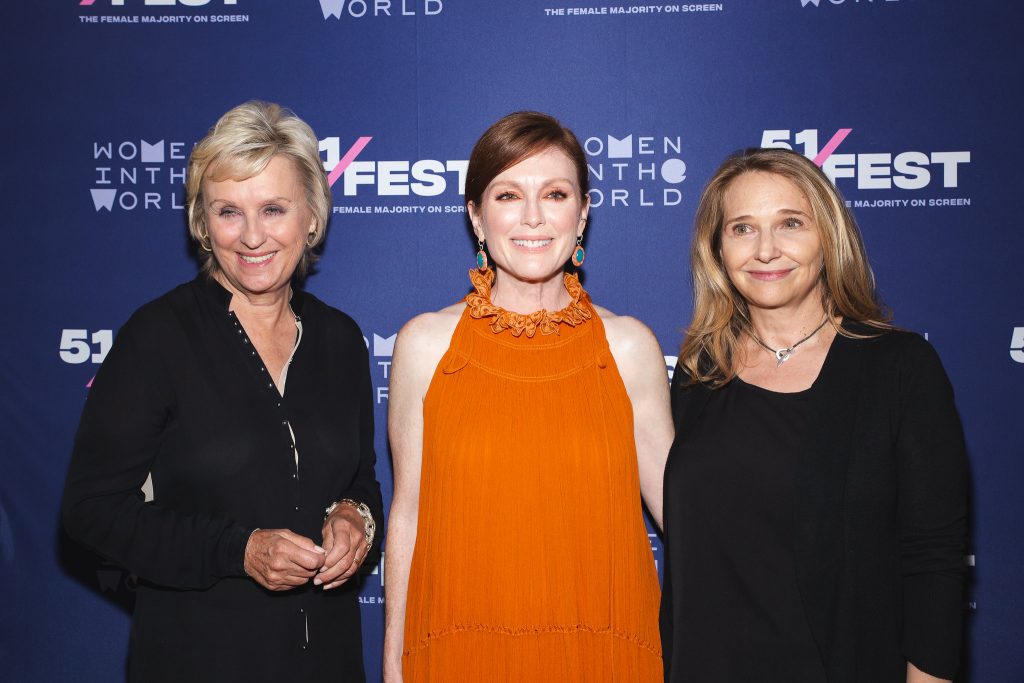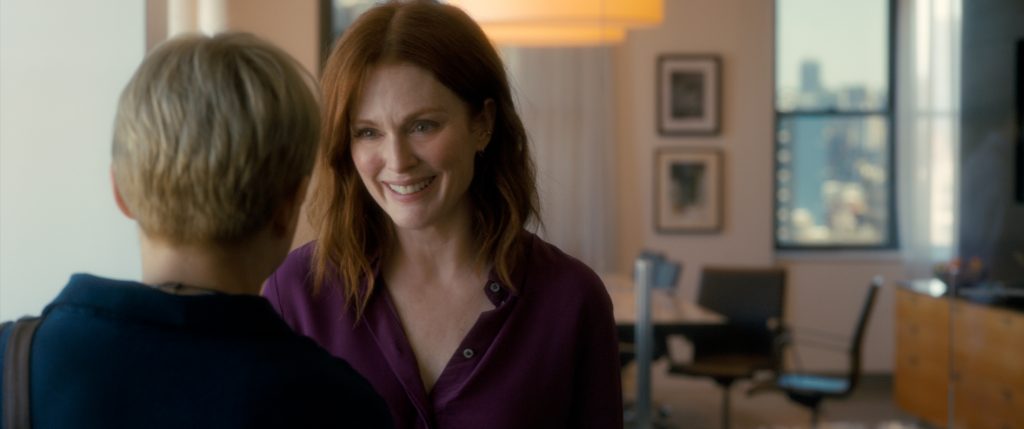January 19, 2024
by Carla Hay
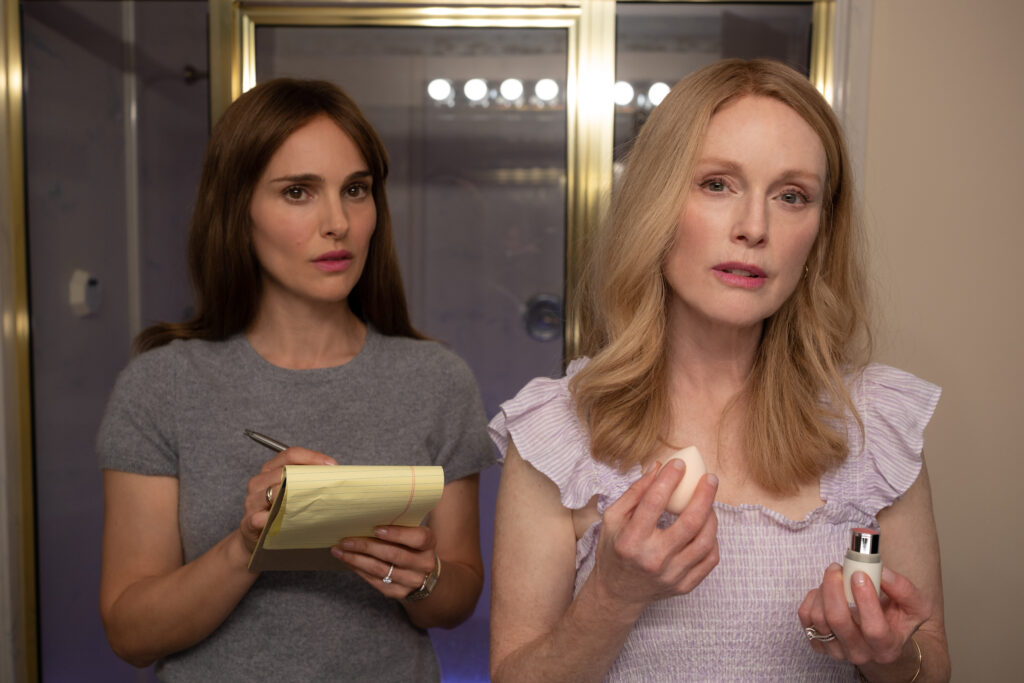
Directed by Todd Haynes
Culture Representation: Taking place primarily in Tybee Island, Georgia, in 2015, the dramatic film “May December” features a white and Asian cast of characters (with a few African Americans) representing the working-class, middle-class and wealthy.
Culture Clash: A famous actress is starring in a movie about a disgraced and formerly imprisoned sex offender, who seduced an underage co-worker and later married him, and the actress goes to the couple’s home to do research for the role.
Culture Audience: “May December” will appeal primarily to people who are fans of the movie’s headliners, filmmaker Todd Haynes, and movies that put a fictional spin on real-life scandals.
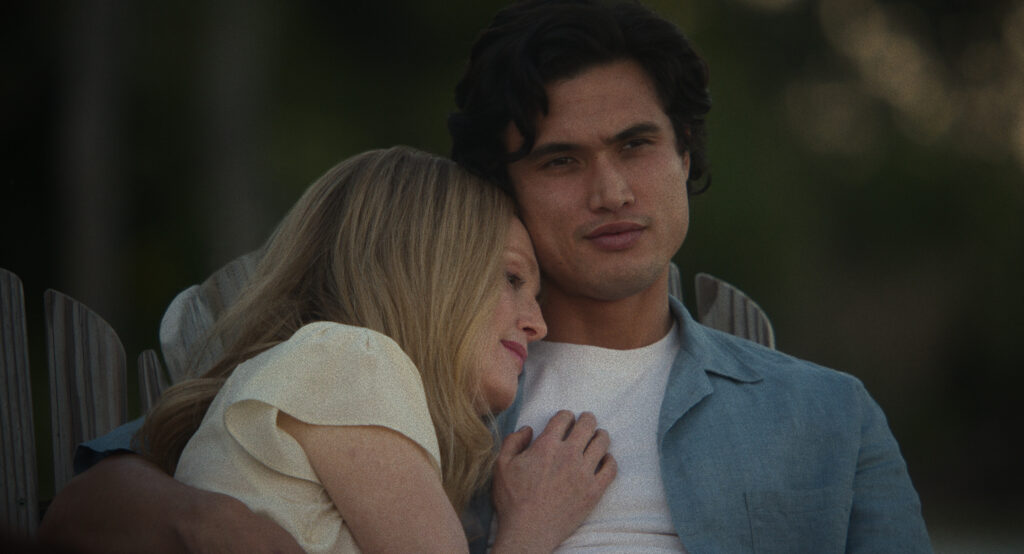
“May December” is a very glossy psychological portrait of manipulation and exploitation, inspired by a real-life sex scandal. Although the principal cast members give above-average performances, it’s a slow-moving film with a fragmented story. Some viewers might see “May December” as a very dark comedy. However, the movie’s few comedic moments are in short spurts and then quickly fade into the background when “May December” becomes more concerned about making viewers increasingly uncomfortable with certain awful characters pretending to be better people than they really are.
Directed by Todd Haynes and written by Samy Burch, “May December” gets its title from the term “May December relationship,” to describe romances that have a big age gap between the partners. The younger partner is supposed to be in the spring of youth (as exemplified by the spring month of May), while the older partner is supposed to be closer to the end of life (as indicated by end-of-the-year month of December). “May December” had its world premiere at the 2023 Cannes Film Festival and made the rounds at other film festivals in 2023, including the New York Film Festival and the BFI London Film Festival.
In “May December,” the story’s scandal is based on the real-life relationship between Mary Kay Letourneau and Vili Fualaau. In 1996, the year they got sexually involved with each other, Letourneau was a 34-year-old married mother of four children, and she was Fulaau’s schoolteacher in Burien, Washington. He was 12 years old.
Letourneau eventually served time in jail (in 1997) and in prison (from 1998 to 2004) for statutory rape and for violating the terms of her 1997 plea agreement, which had required her to stay away from a then-underage Fualaau. Her first husband divorced her in 1999. She gave birth to two daughters fathered by Fualaau. The first daughter was born in 1997, while Letourneau was awaiting her sentencing. The second daughter was born in 1998, when Letourneau was in prison. Letourneau and Fualaau got married in 2005, but they separated in 2019. Letourneau died of colorectal cancer in 2020, at the age of 58.
All of this background information is helpful to better understand the nuances in “May December.” In the movie, the character based on Letourneau is named Gracie Atherton-Yoo (played by Julianne Moore), while the Fualaau-based character is Joe Yoo (played by Charles Melton), who are living a quiet suburban life together as married parents in Tybee Island, Georgia. Elizabeth Berry (played by Natalie Portman) is a 36-year-old famous actress who is starring as Gracie in a made-for-TV movie. “May December” (which takes place in 2015, which is about 23 years after the scandal) shows what happens over the course of several days when Elizabeth goes to Tybee Island to do research for the role by visiting Gracie and Joe, as well as interviewing their friends, family and other people who know this notorious couple.
“May December” begins with a scene of Elizabeth in a Georgia hotel room as she gets ready to go to the Yoo home to meet Gracie and Joe for the first time. Meanwhile, Gracie and Joe are at their home, where they are preparing to welcome Elizabeth to a family cookout in their backyard. Gracie is in the kitchen making deviled eggs and a cake with her friend/neighbor Rhonda (played by Andrea Frankle), who is Gracie’s staunchest defender and supporter. It’s later revealed that Gracie has a home-based business where she makes cakes. Joe works in a hospital as a medical assistant.
Before Elizabeth arrives, Gracie tells Rhonda what she expects from Elizabeth: “All I ask is that she’s polite and not just sitting there with her sunglasses on.” And when Elizabeth and Gracie meet in a polite but slightly guarded way, Gracie tells Elizabeth: “I want you to tell the story right.” Elizabeth, who speaks in calm, measured tones, replies: “I want you to feel seen and known.”
In real life, Letourneau and Fualaau had two daughters. In “May December,” Gracie and Joe have two daughters and a son. Eldest child Honor (played by Piper Curda) is an outspoken college student living away from home, but she will soon be visiting to attend the high-school graduation of her younger twin siblings: insecure Mary (played by Elizabeth Yu) and rebellious Charlie (played by Gabriel Chun). Another member of the Yoo family is Joe’s widower father Joe Yoo Sr. (played by Kelvin Han Yee), a Korean immigrant who—just like his son Joe—chain smokes when he’s feeling stressed-out.
Over time, viewers see that Gracie likes to appear composed and in control in public and when Elizabeth is there observing. But in private and when Elizabeth isn’t there, Gracie is high-strung, very demanding and overly critical of other people. When things don’t go her way, Gracie loves to play the victim.
Gracie also treats Joe as someone whose only purpose in life is to make her happy. When Gracie has a tearful meltdown because a customer canceled an order for a cake that Gracie already made, Gracie expects Joe to comfort her like someone who needs to be comforted over the death of a loved one. And there are signs that Gracie has an undiagnosed mental illness, such as when Gracie insists to Joe in private that he was the one who seduced her when he was a child.
Another scene that shows how Gracie is a master manipulator is when she and Mary (with Elizabeth invited to observe) go shopping for Mary’s graduation dress. At a store’s dressing room, Mary tries on dresses. Mary’s first choice is a sleeveless dress, but Gracie doesn’t want Mary to wear a dress that will expose Mary’s arms. Mary gets annoyed with Gracie and firmly says that she’s getting the dress. However, Mary changes her mind when Gracie comments that other girls in the graduating class probably won’t wear sleeveless dresses because sleeveless dresses will make their arms look fat.
Over time, an unspoken rivalry develops between Gracie and Elizabeth, who is very aware that image-conscious Gracie is bothered by Elizabeth, who is going to play a younger version of Gracie. One of the movie’s most memorable scenes about this power struggle is when Elizabeth and Gracie are standing in front of a bathroom mirror in Gracie’s home while Gracie is putting on makeup. Rather than have Elizabeth mimic her, Gracie insists on putting the makeup on Elizabeth herself.
Joe is quiet, humble and unassuming. And at first, he seems to be in the background of Elizabeth’s thoughts as she puts most of her initial focus on studying Gracie. It should come as no surprise that the more that Gracie gushes about Joe to make it sound like they have a beautiful love story, the more that Elizabeth seems to get curious about Joe and takes more of an interest in him. Elizabeth flatters Joe and drops hints that he deserves a better life than the one that he has with control-freak Gracie. But does Elizabeth really care about Joe as a person, or does Elizaebth care more about immersing herself so much into Gracie’s life that she wants to replicate aspects of Gracie’s life?
Some of the people whom Elizabeth interviews for her research are Gracie’s ex-husband Tom Atherton (played by D.W. Moffett), who is now married to another woman; Gracie’s adult son Georgie Atherton (played by Cory Michael Smith), from her first marriage, who bitterly tells Elizabeth that Gracie ruined Georgie’s life; and Colin Henderson (played by Charles Green), the owner of the pet store where Joe worked as a kid and where Gracie was Joe’s supervisor. Observant viewers will notice that for all the interviews that Elizabeth does, she’s not very forthcoming about herself, until a very revealing scene where she makes a speaking appearance in Mary’s drama class and answers prying questions from a few of the students.
No one from Elizabeth’s personal life is seen in the movie, which is the movie’s way of showing how Elizabeth skillfully compartmentalizes her life. Elizabeth is shown briefly talking in phone conversations at her hotel with her fiancé and with the director of the movie where she stars as Gracie. In these conversations, she reveals herself even more to be a very driven and ambitious actress.
Elizabeth is also seen in the hotel room looking at video auditions of teenage boys who will be playing the role of Joe. These boys are supposed to be in their early teens, but Elizabeth remarks that they don’t look “sexy” enough, based on what Elizabeth has seen of Joe. But it’s a sign of a reality disconnect for Elizabeth, because the Joe she’s getting to know is an adult, not the child who was manipulated into an illegal sexual relationship with an adult.
“May December” presents Elizabeth as the central character, but the movie doesn’t always do a great job of balancing the perspectives of Gracie and Joe. There is almost nothing told about how Joe’s side of the family reacted to the scandal, or how Joe’s experiences as a child of an immigrant affected his outlook on life. His father seems to have accepted the marriage of Joe and Gracie, but was this acceptance easy, difficult, or somewhere in between? The movie never says and doesn’t seem to care.
Joe is only given two or three really good scenes that show he’s more than just a loyal “boy toy” husband. Those scenes arrive when awareness starts to sink in with Joe about how much of his childhood was robbed when Gracie chose to cross the line and have a sexual relationship with him when he was a child. It hits him the hardest when he sees Mary and Charlie graduating from high school. This graduation ceremony scene is when Joe fully understands that his children’s coming of age and starting new chapters in their lives as young adults are very different from what he experienced.
What “May December” also does very well is show how Elizabeth’s presence is the catalyst for Gracie and Joe to re-evaluate how they want to be perceived by others and how they perceive themselves. Gracie’s reaction is to “double down” on the narrative that she and Joe have a “fairytale love story.” Joe starts to have doubts and wonders if this “fairytale love story” he’s believed in for all these years was one big lie.
Meanwhile, on another level, “May December” is also a story about what happens when two predators meet and become competitive with each other—not just in how to interpret Gracie’s life but also in trying to prove who’s living a more “fulfilled” life. In that regard, the scenes where Elizabeth and Gracie are in the same room are fascinating to watch. Observant viewers will notice that Elizabeth’s “research” has a more profound effect on her than Elizabeth expects. This is demonstrated effectively in the movie’s final scene.
Portman and Moore are compelling to watch in “May December,” but the movie loses a bit of steam when it can’t really decide how much importance Gracie’s children and in-laws should have in the story. It’s never explained why Elizabeth talked to only one of Gracie’s children from Gracie’s first marriage and not the other children from Gracie’s first marriage. And the character of Joe Sr. seems like a “token” character, because the movie doesn’t seem concerned about how showing or telling how Gracie’s scandalous actions with Joe affected members of Joe’s family.
If “May December” is supposed to be a dark comedy, then it doesn’t quite succeed as a dark comedy or satire like director Gus Van Sant’s 1995 movie “To Die For,” starring Nicole Kidman and Joaquin Phoenix. “To Die For” succeeded in its comedic intentions as a movie version of a real-life scandal about an adult female teacher seducing an underage teenage student to commit a felony crime. As a psychological drama, “May December” excels in its intention to be an unsettling film about the human cost of treating people like pawns in a chess game.
Netflix released “May December” in select U.S. cinemas on November 17, 2023. The movie premiered on Netflix on December 1, 2023.



